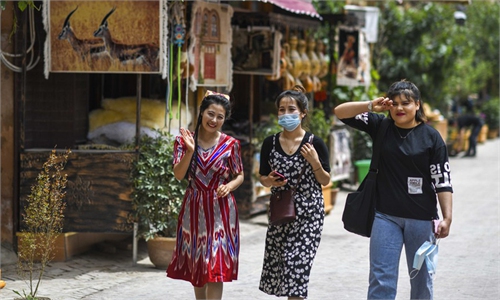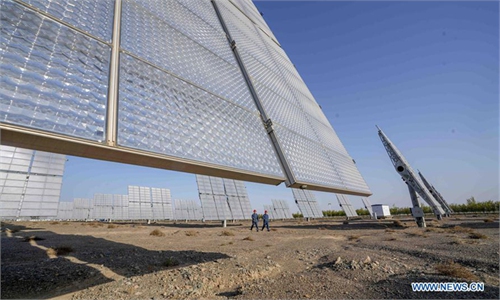
Photo: IC
Editor's Note:An academic report, entitled, "Xinjiang - understanding complexity, building peace," by Eurispes - Istituto di Studi Politici Economici e Sociali, Centro Studi Eurasia-Mediterraneo and Istituto Diplomatico Internazionale, has recently caught worldwide attention. The report provides an in-depth analysis of the historical origin of the terrorist attacks and secessionist forces in Northwest China's Xinjiang Uygur Autonomous Region as well as clues why some Western countries tend to hype issues about the region. The report was orchestrated by independent researchers and endorsed by dozens of internationally renowned academics, politicians and journalists. Fabio Massimo Parenti (Parenti), a foreign associate professor at China Foreign Affairs University, Department of Diplomacy, an international professor at the International Institute Lorenzo de' Medici and a scholar of international relations who initiated the report, recently accepted an exclusive interview with the Global Times (GT) in Rome.
GT: Could you please introduce the background of writing this report?
Parenti: The Xinjiang issue is a very complex one involving many factors such as history and ethnic minorities. But in contrast, the West does not understand the Xinjiang issue at all; they even do not understand the history and current situation of Xinjiang. This makes the West have a complete misunderstanding of the issue, which affects their judgment of Xinjiang region and even China. What's worse, the Xinjiang issue has been exploited and hyped up by some "stakeholders" with ulterior motives. It is worth noting that some existing news and reports on the Xinjiang issue are based on biases and filled of political motives. This is why we hope to present such a report.
The report tries to restore the truth from an objective standpoint in terms of history, geography, economic situation, the origin and activities of terrorism and separatist forces, Western fabrications about the Xinjiang issue and the Chinese government's countermeasures. The aim was to expound the subject - the social and political situation in Xinjiang, which is much more complex than Western media have reported. However, the Western media tend to make some scary headlines and make up false plots to attract attention with the purpose of defaming China. But they fail to realize that such misrepresentations have the potential to create serious diplomatic tensions and seriously undermine existing platforms for bilateral or multilateral cooperation, not only in the political and diplomatic fields, but even in economic and security cooperation. Even worse, failing to face up to, or even misinterpret or ignore China's efforts and practices on the Xinjiang issue provides very dangerous political or moral legitimacy for extremist organizations, terrorist organizations and individuals who attempt to destroy the peaceful environment through violent and subversive means.
Therefore, with the support of scholars from Italy, France, Canada, Australia, the UK and other countries, we believe that it is necessary for the international community to have a systematic, objective and clear understanding of China, which is crucial to reducing confrontation, easing the increasingly tense situations in regions, and ensuring economic cooperation and commercial engagement.
It is fair to say that the current global political and ideological debate in the context of great power confrontations and international competition is very bad. The Xinjiang issue has led to some misjudgments within the European Union, which have affected EU-China relations and cooperation. We believe that our report can make a contribution to safeguarding the interests of Italy and Europe. I want to stress that we did not blame any country in this report. Our purpose, method and analysis model is based on the facts and evidence we provided in this report to let people know more about the truth, to deepen the understanding of the Xinjiang issue, and is helpful for people to make their own judgment among Western media's fabricated news about the issue. Our ultimate goal is to promote fruitful dialogue between China and Italy and help achieve a win-win situation of peaceful coexistence and mutual benefit.
GT: What kind of reactions did this report receive from Italy and other Western countries?
Parenti: This report demonstrates how people in Xinjiang really live. The society is not out of order, and people live a good life. Things are not as chaotic as in the propaganda of some lawless, anti-China forces, including the illegal cult Falun Gong. Quite the contrary, in recent years, Xinjiang's economy has developed rapidly, and the standard of living of the people there has improved greatly. The majority of Westerners have never been to Xinjiang. Many of them have obtained disinformation about the region from false news reports. I hope that this report can objectively show a real Xinjiang. Since nobody [in the West] talks about the fact that Xinjiang has suffered from terrorism for a long time, we strive to clarify what has happened and what is happening in Xinjiang. We provide an honest report and analysis of the region's past and present, rather than placing it under the struggle and wrestling of the international perception or public opinion.
We cite most of the data from international sources and a small portion from the Chinese ones to explain what happened and what China did in response. Many top international scholars consider our report to be more objective, independent, and credible than the materials of recent years that go against China out of interest.
Western countries, such as the US, have some dark sides of their history, and we just don't talk about them very often. There are chaos and parts to be regulated in the history of each country. This is inevitable in the development of history. At the same time, we want to let more and more politicians, as well as the general public, know China's practices and efforts in dealing with ethnic issues and fighting terrorism. In fact, just as mentioned in the report, China's approach and experience in dealing with terrorism are worth learning from, for countries like, for example, Indonesia and Kazakhstan.
I am gratified to find that this report has earned approval and support from many scholars. Since its publication, more and more internationally renowned scholars, politicians and journalists have publicly voiced their support for the content of the report. Recently, some Swedish researchers have done a great deal of work in deconstructing the West's main allegations on the Xinjiang's situation. Our report is complementary at least, more based on processes, contextualization and history than deconstruction.
GT: When did you visit Xinjiang? In Xinjiang, you said that you witnessed with your eyes the full freedom of religious beliefs enjoyed by Uygur people and other ethnic minorities, and that you could not find any evidence of so-called forced labor or genocide. Can you talk more about your experience and feelings in Xinjiang?
Parenti: When I returned from Xinjiang, I realized that what I saw about Xinjiang may not be quite the same as what many Western media have described. Some Western think tanks, scholars and media have made false reports and groundless accusations about Xinjiang, which have had a serious negative impact. I was deeply impressed by the local history and culture, unique ethnic customs and beautiful natural environment. After the investigation, I continued to stay and travel in Xinjiang for some time. What I saw is a Xinjiang where Uygurs and other ethnic minorities enjoy full freedom of religious beliefs, and where their language and culture are effectively protected and inherited. I did not see any trace or evidence of the so-called forced labor or the so-called genocide anywhere.
Not only me, but those around me who have visited Xinjiang have not seen any evidence of forced labor in China for agricultural or other purposes. Instead, I've seen young people come out of vocational education and training centers and go to factories, either in Xinjiang or in other parts of China, to seek series of job opportunities. I hope I can visit China and Xinjiang Uygur Autonomous Region again when the epidemic situation is better. The sources of our report and data are mostly from those who have studied or lived in China and Xinjiang and have been involved in different ways in studying the geopolitics and development of the region. The historical issues in Xinjiang are very complex, and the issues that the Chinese government has to deal with are very real and complex. Only with a deep understanding of the region's history and development can one understand China's measures and policies.
GT: The counter-terrorism and eradication of extremists measures taken by the Chinese government in Xinjiang are based on the rule of law, respect for human rights and protection of the legitimate rights and interests of the parties concerned. These measures have achieved remarkable results. Why does the West constantly smear and suppress China on the issue of Xinjiang without any evidence to support its allegations?
Parenti: We feel the urgent need to rebalance the debate about Xinjiang, a Muslim-majority autonomous region in China. In recent years, under the goal and pressure of the anti-China and containment policies implemented by the US and some other countries, Xinjiang, together with some other internal affairs of China, has been highly politicized by countries trying to contain China's development. The US and its closest allies in particular, especially the Five Eyes Alliance, have taken China as the main target of their concern and containment. They use this issue to suppress China.
If you pay close attention, you can find that the so-called reports on Xinjiang issued by some American and British organizations have the shadow of anti-China forces behind them, who have always been the main critics of China's political and economic systems. Their report on the "Xinjiang-related issues" was of poor quality and obviously biased, lacking sufficient and serious research and facts, and the accusation of "genocide" was groundless. Some Western think tanks, scholars and media outlets fabricated false report of Xinjiang and unwarranted charges, which have caused serious negative impact. These people and institutions are public anti-China organizations. Their so-called report has been wrapped into independent report. Then Western governments have responded by imposing specific sanctions against Xinjiang. But these measures are baseless. Its purpose is not to protect human rights at all, but to suppress, contain, isolate and weaken China.
These measures have no scientific basis, but are based purely on ideological and geopolitical positions. This has happened many times before. As for the US and these "human rights agencies", they don't care about the welfare of the people of Xinjiang or Hong Kong, they don't care about promoting the process of peaceful coexistence, they only care about how to increase the tension and compete for international power.
GT: After reading the report, some Chinese netizens said that "you can't wake a dissimulation," adding that European countries have suffered greatly from terrorism and extremism in recent years. Why do they still judge China's efforts to fight the three forces (of separatism, extremism and terrorism) through colored-spectacles?
Parenti: Since the late 1980s, separatism, religious extremism and radicalism have been evolving alternately in Xinjiang. Local guerrilla groups based on ethnicity were transformed into transnational movements with roots in Islam, which has greatly undermined regional peace and stability. It can be said that the three forces have been plaguing Xinjiang, and China's efforts to counter these three forces have been continuing, but they are often ignored and unknown by the West.
This is quite an interesting question. The way China fights terrorism is significantly different from that of the West. Chinese lawmakers take preventative measures to deal with criminal acts of terrorism. They prevent such acts on the level of morals and culture, which is not what Western countries advocate. Instead, the West uses more of an investigative approach. Due to this difference, China's counter-terrorism measures and policies have been misinterpreted and smeared.
As pointed out in our report, China's domestic counter-terrorism policies have been flexible and effective, and some Muslim countries, such as Indonesia, are following China. For example, the vocational education and training centers in Xinjiang, which the West has discredited, are a beneficial exploration and the latest experience of China's efforts in fighting terrorism and eradicating extremism. They have played an active role in respecting and safeguarding human rights, effectively eliminating the soil and conditions for the growth and spread of terrorism and religious extremism, and maintaining social harmony and stability. Moreover, China's policies in Xinjiang, including focusing on investment and economic development in border regions, boosting employment, and helping integrate marginalized people into society, have all worked well. Through the data, it is easy to note that these attempts have achieved some excellent results. We have seen a significant decline in violence in Xinjiang over the past five years, which has greatly increased the sense of security among the local population.
As far as I know, between 2008 and 2020, more than 1,200 delegates from over 100 countries have visited Xinjiang. This includes the officials of the United Nations (UN), foreign diplomats, UN ambassadors, journalists and religious authorities. During their visits, these people have found neither the evidence of any suggested planned suppression nor the behavior of suppressing local populations based on ethnicity or religion. On the contrary, many scholars and witnesses have praised the Chinese government's policy of setting up vocational education and training centers in Xinjiang to promote de-radicalization and solve the problems in Xinjiang fundamentally. Some Muslim-majority countries, such as Kazakhstan and Indonesia, have followed this policy. In our report, we included photos we took in Xinjiang. These are not only good examples, but also first-hand, trustworthy evidence that can stand up to inspections. I'm not worried about any attacks on this by Western public opinion.
GT: This year marks the 20th anniversary of the Shanghai Cooperation Organization (SCO). What is your opinion on China seeking counter-terrorism cooperation with related countries?
Parenti: The SCO has been expanding for 20 years. It has strengthened the cooperation of the countries in the region. Cooperation against terrorism has effectively maintained regional security and stability. It has provided many effective explorations and attempts for transnational counter-terrorism cooperation. China has indeed played a very good role in global development. In my opinion, China is one of the best leaders in advocating and participating in the "international order system" and international affairs. At the same time, China is a country full of surprises. I have seen its sustained power and possibilities.
In contrast, in the West, the US has for some time been constantly developing and adjusting its strategy to contain China since the collapse of the Soviet Union. The US has shifted the focus of its regional interests to Central Asia, the intersection of the old and new Silk Roads. Several military and political campaigns promoted and supported by the West have led to regime changes in many countries in some regions. They have destabilized many strategic areas and fostered the links of some terrorist organizations and extremist forces.



